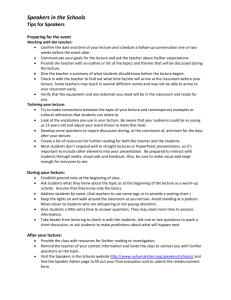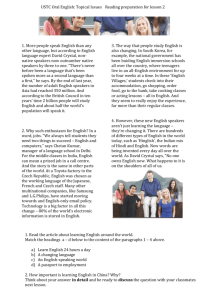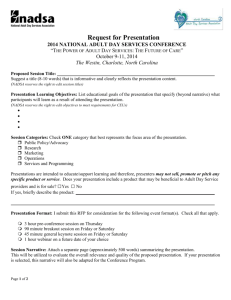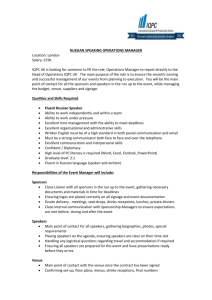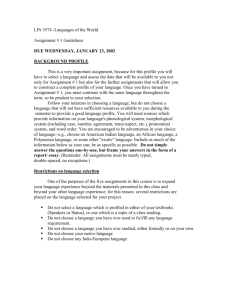Event Planning Manual
advertisement
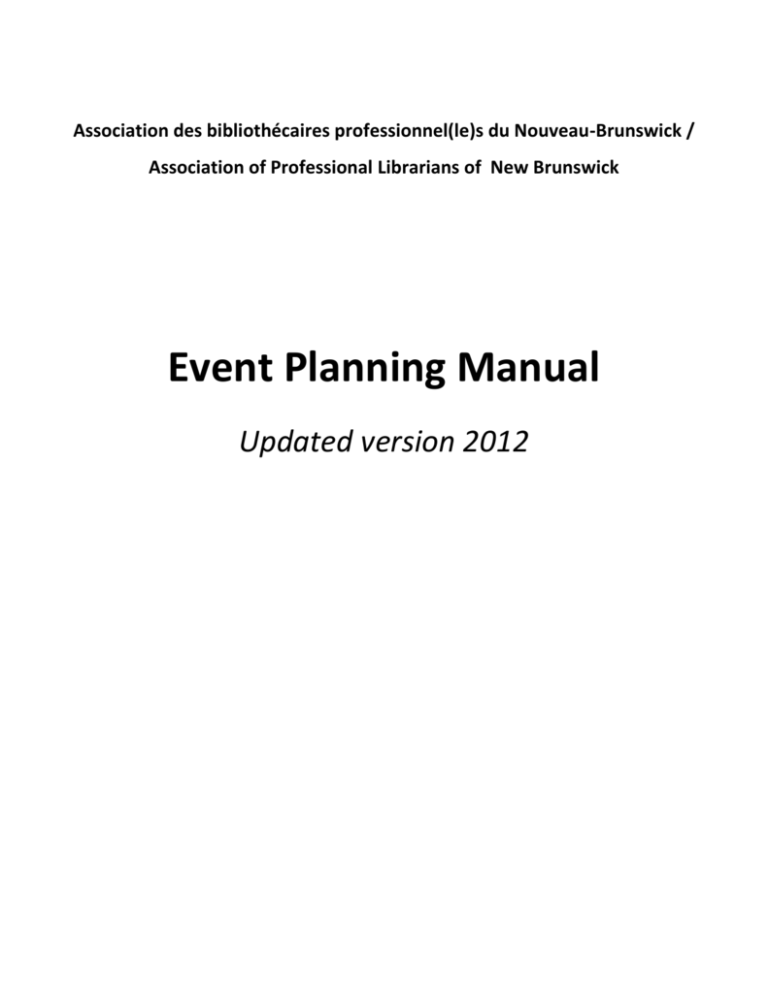
Association des bibliothécaires professionnel(le)s du Nouveau-Brunswick / Association of Professional Librarians of New Brunswick Event Planning Manual Updated version 2012 ABPNB / APLNB Event Planning Manual Table of Contents Page Introduction 3 General Information 4 Timetable (by month) 5 Important elements of the Event Planning 8 1. Accommodation 8 2. Exhibits 8 3. Finances 8 4. Food 8 5. Hand-outs 9 6. Interpretation 9 7. Room temperature 9 8. Scheduling 10 9. Script 10 10. Site selection 10 11. Speakers 11 12. Sponsors 11 13. Website 12 Appendices Sample forms, letters, etc. Committee minutes Updated version 2011 2 ABPNB / APLNB Event Planning Manual Introduction The ABPNB/APLNB Event Planning Manual is based on the existing Conference Planning Manual (original version 1997, updated in 2002). In this manual you will find a timetable to help plan your activities, as well as sample contracts, letters, minutes, press releases and other documents. This manual is intended to serve as a guide to make the process of event planning as easy and smooth as possible for organizing committees. There are no hard-and-fast rules to obey; your ingenuity will help make each event unique. At the time of the 2011 update, the Association’s two major annual events are: AGM & Conference and Spring Event. *** Committee 1997 (original version): Marilynn Rudi (compiler of manual), Mireille Mercure (Committee chair), Barb Malcolm, Carole MacFarquhar, Jennifer Leger, Linda Hansen Updated in 2002: Carole MacFarquhar (Committee Chair), Diane Buhay, Jennifer Edgar, Joann Hamilton-Barry, Jane Higle, Beverley Lyons, Leslie McVicar, Mireille Mercure, Pamela Stephens-Earle Updated in 2011: Victoria Volkanova (Committee Chair), Carole MacFarquhar, André Gionet Updated in 2012: Karen Armstrong Updated version 2011 3 ABPNB / APLNB Event Planning Manual Updated version 2011 4 ABPNB / APLNB Event Planning Manual General Information AGM and Conference The Annual General Meeting & Conference normally take place in October, with the AGM being held Friday night and the Conference held Saturday. Members will be given the opportunity to sign up for the Conference planning committee at the AGM. The place of the next AGM will be decided at the AGM of the current year. The AGM & Conference are normally held in one of the three major cities of the Province (i.e. Fredericton, Moncton or Saint John) which are easily accessible from around the Province. However, the AGM may decide to hold the event in a different location, to serve the population of more remote regions. As to the date of the event, it is recommended to choose a date that doesn’t coincide with other major events (professional, cultural or other) that might interfere with the attendance. However, it might just be the choice of the Executive / Planning committee to associate itself with another event in order to attract more participants and to be able to offer them an enriched experience. Spring Event The Spring Event is a one-day event that normally takes place on a Saturday in April. The date, place and theme of the event should ideally be chosen by the newly-elected Board of Directors as soon as possible (i.e. at the first Board meeting). It is suggested to collect ideas for possible themes, locations and speakers throughout the year, in order to facilitate the planning process. Organizing Committee: four roles in one (planning, i.e. budget, sponsors / program, i.e. theme, speakers / local organizing, i.e. accommodations, venues, food, local materials / promotion, i.e. posters, invitations) Updated version 2011 5 ABPNB / APLNB Event Planning Manual Timetable December - January *The Executive decide upon the conference theme and may have some suggestions for speakers First meeting of the Organizing Committee Elect a chair for the committee who will be the liaison with the Executive Make sure someone takes minutes! A rotating secretary works well. Try to recruit more committee members (up to 6). At least one should be bilingual. Preliminary discussions on speakers, locations (for the AGM, reception, workshop, lunch and hotel accommodations), conference budget, and sponsors February Decide on desired locations and make inquires on price and availability Start contacting speakers Identify potential sponsors, major and minor April Locations should be finalized and reservations made. Confirm all details in writing, signed if possible. Invite representative from Conference location to participate in welcome. Actively approach sponsors, especially the major ones (for Saturday lunch) Start approaching Exhibitors or publishers to donate books for auction, if desired Start working out the timetable of events for Friday night and Saturday May Go over catering details for Reception Friday night Get hotel to reserve a block of rooms at a special conference rate; inquire about government rate Start soliciting sponsors for door prizes, speakers' gifts Start soliciting sponsors for coffee breaks, evening reception Contact mayor's office to give official welcome, contact other officials (i.e. MLAs) Updated version 2011 6 ABPNB / APLNB Event Planning Manual June Ask city for bilingual (or 50% Eng. + 50% Fr.) conference packages (with maps, pins, etc.) - anticipated registration + 10. Start arranging tours of local libraries, if applicable July Work on forms for handouts, agenda, registration etc. Solicit biographies, CV's from speakers for conference handout Create a promotional poster for the conference, to be distributed and displayed in the libraries Book AV equipment requested by speakers. August Send out publicity: registration form, maps, etc, via e-mail and on the Association’s website Write promotional article for Biblionet Consider signage and other promotional materials, in addition to the banner Distribute the promotional poster Make sure that the closing date for reserved room block will allow people to make reservations after the invitations has been sent out Early September Confirm arrangements for the reception and lunch to avoid last minute glitches - VERY IMPORTANT Review the donations to be used as door prizes, speakers' gifts Ensure that all sponsorship monies are received. The Treasurer may send an invoice to pledged sponsors if necessary. Review the VIP's giving the welcomes (Mayor, Regional librarian, etc.) - send them letter of complimentary registration, agenda, etc. Decide who will introduce the President, give housekeeping information (bathrooms, temperature, etc.) The order of introductions Decide where to display the Association banner Prepare press releases for the conference (in conjunction with the Executive or Public Relations Committee, if exists) Updated version 2011 7 ABPNB / APLNB Event Planning Manual Decide who will be working at the Registration Desk (APLNB Treasurer plus one committee member) Send out bilingual press release Late September Stuff the conference packages Check that network connections are up, computers available if needed Check other equipment (photocopier, overheads, etc.) is available if needed Inform restaurant of numbers for lunch Confirm set up of conference room Review the conference evaluation form to be distributed to all attendees, if using Make sure that conference sponsors are publicly acknowledged (i.e. names / logos on promotional materials, on the website etc.) Wrap gifts October (after the AGM) Wrap-up celebratory session Write letters of thanks to speakers and sponsors Review responses to conference evaluation form Brief report for Executive Updated version 2011 8 ABPNB / APLNB Event Planning Manual Important elements of the Event Planning 1. Accommodations Ask at least one hotel to hold a block of rooms for conference delegates at a special conference rate. Also enquire about the government rate for those attendees who are eligible. Ask the hotel to hold the block of rooms as long as possible to ensure that the Biblionet containing hotel information reaches members in time for them to reserve. Always provide delegates with information on alternates such as other hotels and B & B's. Consider price, convenience and ambiance. 2. Exhibits Examples: New Brunswick publishers with their books, a university’s writer– in-residence, local bookstores etc. You must allow time in the conference program for attendees to visit the exhibitors (i.e. before or after lunch). Exhibitors normally pay a fee to exhibit at a conference. There should be sufficient space for vendors' displays and customers to browse. If possible, the exhibits should be open to the public. 3. Finances The conference is self-financing, with some "seed" money available from the Executive if needed. A preliminary budget should be set up early in the planning year and amended as costs become firm. To avoid setting a precedent that may be impossible to follow, keep the registration fee stable, even if a major donation could allow it to be lowered or eliminated altogether. Registration fee in the previous years: 35$-45$ (members / non-members) 4. Food The wine and cheese reception and all coffee breaks can be catered or you can do it yourself; shop around and get price quotations. If you are serving food during Saturday morning registration (muffins, croissant, Danishes, fresh fruit, let people know and they may not need to buy breakfast. Provide a variety of hot and cold Updated version 2011 9 ABPNB / APLNB Event Planning Manual drinks, caffeinated and decaf during Saturday's program. Depending on your finances, you can have an open bar or a cash bar at the evening reception. One option is to give one ticket for a free glass of wine, with further alcoholic beverages being purchased. Traditionally, there has been a lot of food leftover at the reception, so plan accordingly. The lunch on Saturday can be catered in or the group can go out to a restaurant. There should be some choice for those who have allergies, are vegetarians etc. 5. Hand-outs The Association’s Executive is responsible for all handouts for the AGM. The Conference package (handed out at Registration desk) should include a copy of the agenda, information about the speakers, the list of sponsors, a city map and other local information, and a pen and paper if available. If making unilingual hand-outs, plan to make 2/3 in English and 1/3 in French. One way to ensure that everyone gets the handouts and to lessen congestion is to put them on each chair before the beginning of each session. Try to avoid handing out paper during a talk, as this is very distracting. However, it may be decided to make the conference paperless out of environmental concerns; in that case an alternative way of providing the information should be thought of. 6. Interpretation* - haven’t been used in the last few years Set up for simultaneous translation: Two interpreters and a technician. There are 2 interpretation companies in NB: Simultec (506-459-2811) and Intrad (Annette Pelletier, 506-459-8204). It is essential to book the interpreters as soon as possible. A big expense; look for bilingual speakers / sessions. 7. Room temperature Talk to location staff prior to event to try to anticipate problems or changes and identify what options exist during the event. Be alert to the room temperature during the event and try to adjust it if necessary. Ask attendees several times throughout the event if the temperature is comfortable. Updated version 2011 10 ABPNB / APLNB Event Planning Manual 8. Scheduling Friday night AGM: Allow 2 hours for this meeting Saturday workshop: You must be prepared for both the conference running over and under schedule. Get off to a good start by insisting the conference start on time. Appoint someone to watch the clock and diplomatically warn speakers if they run over time. You can shorten or lengthen coffee breaks and lunch to make up for scheduling difficulties if necessary. You can also tell speakers your scheduling problems and ask if they could speak for more or less time (this may not work). 9. “Script” Just prior to the conference, distribute a detailed agenda, identifying exactly who does what, when, where. Distribute it to the committee and everyone who has an organizing role to play (e.g. Treasurer, MC) 10. Site selection The AGM, reception, workshop and lunch don't have to be held at the same place. However, there should be quick and easy access between sites. Each location must be large enough to accommodate the estimated number of attendees. The cost of the site is a major consideration. Another consideration is any potential noise problem from adjacent rooms during the time of the event. Possible locations include libraries (usually free), hotels, museums, educational institutions and clubs. Reserve sites as soon as possible. Get details in writing, even if you have to write it up yourself. Get them to sign it. Don't forget to personally confirm everything a few weeks before the conference There is usually a meeting for incoming and outgoing executive members immediately following the conference. This may take place in the same room as the conference, or somewhere nearby. Updated version 2011 11 ABPNB / APLNB Event Planning Manual 11. Speakers The Executive should provide some guidance on keynote speakers. Contact all speakers well in advance to avoid scheduling conflicts. Ask for biographical information, equipment needs and a general idea of the presentation. This is needed 4-6 weeks in advance of the event, to allow time to create press releases. Try to balance English, French and bilingual speakers. The Association will pay the speaker's travel expenses, meals and conference fee. We arrange accommodation and local transportation. We also give a small gift to each speaker. Contact the mayor as early as possible about welcoming conference delegates. When the location is chosen, invite a representative to participate in the official welcome. Both should be sent letters offering complimentary registration to the AGM/Conference. If there is a sponsoring library for the event, ask the Director well in advance to participate in the official welcome Saturday morning. Contact the Master of Ceremonies for the Saturday workshop well in advance to let him/her know the conference plan. Usually, but not necessarily, the M.C. is the Association’s past president or current president Ask from 1 to 3 local librarians to give mini presentations after the lunch Saturday, to introduce themselves and what they do. 12. Sponsors Solicit sponsors well in advance. It is very helpful to your planning if you can get the biggest sponsors pinned down early. However, don't be afraid to follow up at the last minute with potential sponsors. Items for sponsorship include: o o o o o Saturday lunch (biggest item) Friday’s reception (wine & cheese, or other) coffee breaks door prizes speakers' gifts In addition to targeting traditional library suppliers (journal vendors, suppliers) Updated version 2011 12 ABPNB / APLNB Event Planning Manual think of new clients such as computer suppliers. NBTel and Fundy Cable have been major sponsors in the past. You may ask for specific items or make a general request. Ask local businesses for contributions of funds or in kind donations. Don't exclude non-traditional sources (especially you have any connections). Any local store where you are a known customer might be willing to provide something. Try to avoid having two direct competitors as sponsors. There are template letters soliciting sponsorship and template letters of thanks. Electronic documents will be kept in the Board of Director’s documents section of the APLNB website. 13. Website Create a prominent webpage for the conference as early as possible; start putting the basic information such as theme, venue(s), dates, maps etc. As soon as more information become known / confirm, add it to the page (i.e. guest speaker, sponsors, accommodations etc.). The webpage is the place for all the downloadable information, such as the program, the maps etc. Link the speakers’ names to their bio, the title – to the description of the presentation. Is the webpage mobile-friendly? Updated version 2011 13

